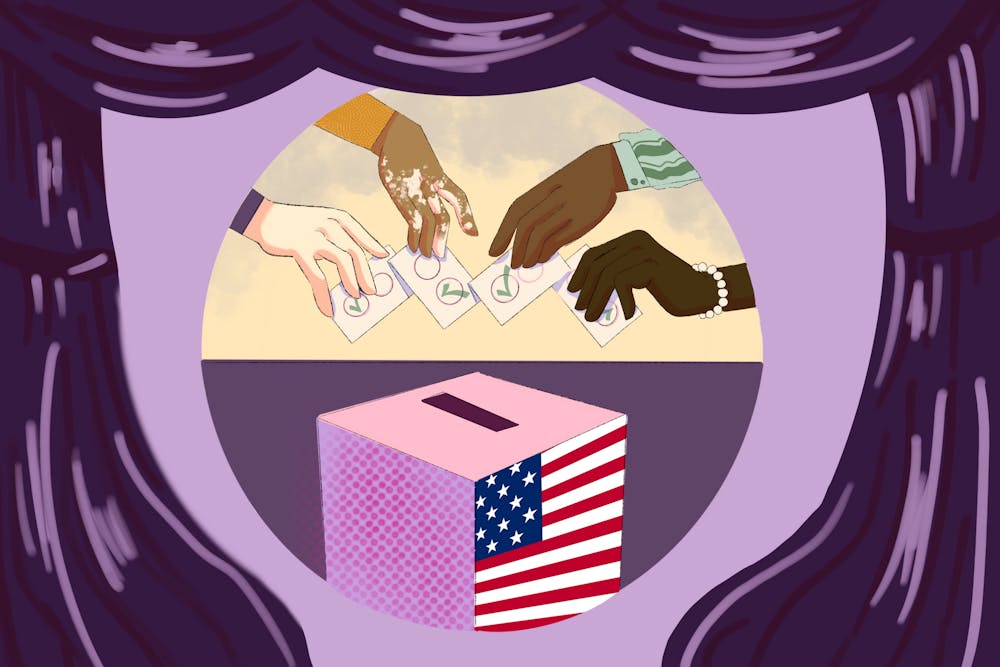The 2024 Presidential election is only 27 days away, and some student organizations are helping to spread the word about how students can register to vote.
Student Government set up tents along Davis Field from Sept. 30 to Oct. 2 as a way to get the student body involved in the election process, said Sean Deuty, the elections commissioner for Student Government.
Students are able to register through QR code links handed out at the tents. These links provide students with the resources needed to register to vote, Deuty said. The goal is to draw attention to the registration deadline as well as prepare students for the upcoming election.
"It's super important (to register) because a lot of (students) are from out of state," Deuty said. "A lot of people in South Carolina feel like their vote is not going to change anything."
Deuty said he hopes that students will register before the deadline passes and it becomes too late, especially for out-of-state students who may be unaware of their state's guidelines. Deuty said voters should make sure to do research on the candidates and to become familiar with the ballot to make the process easier.
Student Government is not the only organization on campus that is advocating for student registration.
Democracy Matters is a bipartisan student organization on campus that encourages voter registration and creates resources for students on campus. The chapter at USC was started in August of 2023.
Allie Wright is the vice president of the organization and works with her executive board to table and create educational materials for the student body.
“Our job is to just provide an outlet of where people can come and just ask questions about how to vote," Wright said.

For first-time voters, Wright also recommended they stay educated on what each candidate stands for.
“You don’t want to go into voting for a person just based on their party," Wright said. "You really want to know them as a candidate and what they actually stand for."
Westley Robinson, a junior political science student and the secretary of Democracy Matters, wants to focus on local and Congressional ballots as well, he said.
“This election is the general election, and we’ve got a lot more than just the president that’s up for election this time," Westley said. "We’ve got 12 different governors, we’ve got 34 Senate seats and then all of the House (representatives) are up for reelection this year,” Westley said.
Wright believes that this November is an important time for the voices of the American people to be heard, she said.
She said she believes that younger voters will have higher turnout in 2024 due to the amount of media Generation Z consumes on a day-to-day basis.
“If you want change to happen, we are the people to make change happen,” Wright said. “Our representatives, the people that are advocating for change, are advocating for change because we want change. If you actually want to see that happening, going out to vote will make that happen.”
How to register to vote
Before new voters are able to vote, they must register in their home state. Registering to vote is a short process, but every state has different requirements and deadlines to register.
The deadline to register in South Carolina in 2024 is Oct. 14. The date was extended from Oct. 5 in order to allow those who have been affected by Hurricane Helene additional time to register.
Other states have later deadlines, such as North Carolina on Oct. 11 and Virginia on Oct. 15.
Registering deadlines vary across each state, but they all can be found on the United States Election Assistance Commission's website.
When registering to vote, the person must fill out personal information such as age, birthday and name among other information. Their address is needed to confirm residency in the state they are registering to vote in. They will also need a valid ID for the state, and some states require people to register with a political party as well.
Individuals who are not in their home state can register online though vote.gov. Mail-in ballots are also available to those who are unable to return home for the election to vote in their assigned precinct. Those requesting a mail-in ballot will have to provide an address to where they would like to send their ballot.

